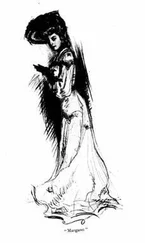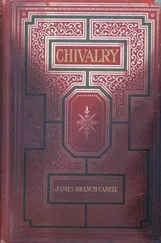James Cabell - The Rivet in Grandfather's Neck. A Comedy of Limitations
Здесь есть возможность читать онлайн «James Cabell - The Rivet in Grandfather's Neck. A Comedy of Limitations» весь текст электронной книги совершенно бесплатно (целиком полную версию без сокращений). В некоторых случаях можно слушать аудио, скачать через торрент в формате fb2 и присутствует краткое содержание. Жанр: Фэнтези, на английском языке. Описание произведения, (предисловие) а так же отзывы посетителей доступны на портале библиотеки ЛибКат.
- Название:The Rivet in Grandfather's Neck. A Comedy of Limitations
- Автор:
- Жанр:
- Год:неизвестен
- ISBN:нет данных
- Рейтинг книги:3 / 5. Голосов: 1
-
Избранное:Добавить в избранное
- Отзывы:
-
Ваша оценка:
- 60
- 1
- 2
- 3
- 4
- 5
The Rivet in Grandfather's Neck. A Comedy of Limitations: краткое содержание, описание и аннотация
Предлагаем к чтению аннотацию, описание, краткое содержание или предисловие (зависит от того, что написал сам автор книги «The Rivet in Grandfather's Neck. A Comedy of Limitations»). Если вы не нашли необходимую информацию о книге — напишите в комментариях, мы постараемся отыскать её.
The Rivet in Grandfather's Neck. A Comedy of Limitations — читать онлайн бесплатно полную книгу (весь текст) целиком
Ниже представлен текст книги, разбитый по страницам. Система сохранения места последней прочитанной страницы, позволяет с удобством читать онлайн бесплатно книгу «The Rivet in Grandfather's Neck. A Comedy of Limitations», без необходимости каждый раз заново искать на чём Вы остановились. Поставьте закладку, и сможете в любой момент перейти на страницу, на которой закончили чтение.
Интервал:
Закладка:
He could hear a huckster outside on Regis Avenue. The colonel never forgot the man was crying "Fresh oranges!"
"He kissed me, Olaf. Yes, I let him kiss me, even after he had asked me if he could. No sensible girl would ever do that, of course. And then I knew—"
Patricia was horribly frightened.
"And afterwards the jackass-fool made matters worse by calling me 'his darling.' There is no more hateful word in the English language than 'darling.' It sounds like castor-oil tastes, or a snail looks after you have put salt on him."
The colonel deliberated this information; and he appeared to understand.
"So Parkinson has gone the way of Pevensey,—. and of I wonder how many others? Well, may Heaven be very gracious to us both!" he said. "For I am going to do it."
Then composedly he took up the telephone upon his desk and called Roger Stapylton.
"I want you to come at once to Dr. Rabbet's,—yes, the rectory, next door to St. Luke's. Patricia and I are to be married there in half an hour. We are on our way to the City Hall to get the license now…. No, she might change her mind again, you see…. I have not the least notion how it happened. I don't care…. Then you will have to be rude to him or else not see your only daughter married…. Kindly permit me to repeat, sir, that I don't care about that or anything else. And for the rest, Patricia was twenty-one last December."
The colonel hung up the receiver. "And now," he said, "we are going to the City Hall."
"Are you?" said Patricia, with courteous interest. "Well, my way lies uptown. I have to stop in at Greenberg's and get a mustard plaster for the parrot."
He had his hat by this. "It isn't cool enough for me to need an overcoat, is it?"
"I think you must be crazy," she said, sharply.
"Of course I am. So I am going to marry you."
"Let me go—! Oh, and I had thought you were a gentleman—."
"I fear that at present I am simply masculine." He became aware that his hands, in gripping both her shoulders, were hurting the girl.
"Come now," he continued, "will you go quietly or will I have to carry you?"
She said, "And you would, too—." She spoke in wonder, for Patricia had glimpsed an unguessed Rudolph Musgrave.
His hands went under her arm-pits and he lifted her like a feather. He held her thus at arm's length.
"You—you adorable whirligig!" he laughed. "I am a stronger animal than you. It would be as easy for me to murder you as it would be for you to kill one of those flies on the window-pane. Do you quite understand that fact, Patricia?"
"Oh, but you are an idiot—."
"In wanting you, my dear?"
"Please put me down."
She thoroughly enjoyed her helplessness. He saw it, long before he lowered her.
"Why, not so much in that," said Miss Stapylton, "because inasmuch as I am a woman of superlative charm, of course you can't help yourself. But how do you know that Dr. Rabbet may not be somewhere else, harrying a defenseless barkeeper, or superintending the making of dress-shirt protectors for the Hottentots, or doing something else clerical, when we get to the rectory?"
After an irrelevant interlude she stamped her foot.
"I don't care what you say, I won't marry an atheist. If you had the least respect for his cloth, Olaf, you would call him up and arrange—Oh, well! whatever you want to arrange—and permit me to powder my nose without being bothered, because I don't want people to think you are marrying a second helping to butter, and I never did like that Baptist man on the block above, anyhow. And besides," said Patricia, as with the occurrence of a new view-point, "think what a delicious scandal it will create!"
II
Patricia spoke the truth. By supper-time Lichfield had so industriously embroidered the Stapylton dinner and the ensuing marriage with hypotheses and explanations and unparented rumors that none of the participants in the affair but could advantageously have exchanged reputations with Benedict Arnold or Lucretia Borgia, had Lichfield believed a tithe of what Lichfield was repeating.
A duel was of course anticipated between Mr. Parkinson and Colonel Musgrave, and the colonel indeed offered, through Major Wadleigh, any satisfaction which Mr. Parkinson might desire.
The engineer, with garnishments of profanity, considered dueling to be a painstakingly-described absurdity and wished "the old popinjay" joy of his bargain.
Lichfield felt that only showed what came of treating poor-white trash as your equals, and gloried in the salutary moral.
III
Meanwhile the two originators of so much Lichfieldian diversion were not unhappy.
But indeed it were irreverent even to try to express the happiness of their earlier married life …
They were an ill-matched couple in so many ways that no long-headed person could conceivably have anticipated—in the outcome—more than decorous tolerance of each other. For apart from the disparity in age and tastes and rearing, there was always the fact to be weighed that in marrying the only child of a wealthy man Rudolph Musgrave was making what Lichfield called "an eminently sensible match"—than which, as Lichfield knew, there is no more infallible recipe for discord.
In this case the axiom seemed, after the manner of all general rules, to bulwark itself with an exception. Colonel Musgrave continued to emanate an air of contentment which fell perilously short of fatuity; and that Patricia was honestly fond of him was evident to the most impecunious of Lichfield's bachelors.
True, curtains had been lifted, a little by a little. Patricia could hardly have told you at what exact moment it was that she discovered Miss Agatha—who continued of course to live with them—was a dipsomaniac. Very certainly Rudolph Musgrave was not Patricia's informant; it is doubtful if the colonel ever conceded his sister's infirmity in his most private meditations; so that Patricia found the cause of Miss Agatha's "attacks" to be an open secret of which everyone in the house seemed aware and of which by tacit agreement nobody ever spoke. It bewildered Patricia, at first, to find that as concerned Lichfield at large any over-indulgence in alcohol by a member of the Musgrave family was satisfactorily accounted for by the matter-of-course statement that the Musgraves usually "drank,"—just as the Allardyces notoriously perpetuated the taint of insanity, and the Townsends were proverbially unable "to let women alone," and the Vartreys were deplorably prone to dabble in literature. These things had been for a long while just as they were to-day; and therefore (Lichfield estimated) they must be reasonable.
Then, too, Patricia would have preferred to have been rid of the old mulatto woman Virginia, because it was through Virginia that Miss Agatha furtively procured intoxicants. But Rudolph Musgrave would not consider Virginia's leaving. "Virginia's faithfulness has been proven by too many years of faithful service" was the formula with which he dismissed the suggestion … Afterward Patricia learned from Miss Agatha of the wrong that had been done Virginia by Olaf's uncle, Senator Edward Musgrave, the noted ante-bellum orator, and understood that Olaf—without, of course, conceding it to himself, because that was Olaf's way—was trying to make reparation. Patricia respected the sentiment, and continued to fret under its manifestation.
Miss Agatha also told Patricia of how the son of Virginia and Senator Musgrave had come to a disastrous end—"lynched in Texas, I believe, only it may not have been Texas. And indeed when I come to think of it, I don't believe it was, because I know we first heard of it on a Monday, and Virginia couldn't do the washing that week and I had to send it out. And for the usual crime, of course. It simply shows you how much better off the darkies were before the War," Miss Agatha said.
Читать дальшеИнтервал:
Закладка:
Похожие книги на «The Rivet in Grandfather's Neck. A Comedy of Limitations»
Представляем Вашему вниманию похожие книги на «The Rivet in Grandfather's Neck. A Comedy of Limitations» списком для выбора. Мы отобрали схожую по названию и смыслу литературу в надежде предоставить читателям больше вариантов отыскать новые, интересные, ещё непрочитанные произведения.
Обсуждение, отзывы о книге «The Rivet in Grandfather's Neck. A Comedy of Limitations» и просто собственные мнения читателей. Оставьте ваши комментарии, напишите, что Вы думаете о произведении, его смысле или главных героях. Укажите что конкретно понравилось, а что нет, и почему Вы так считаете.



